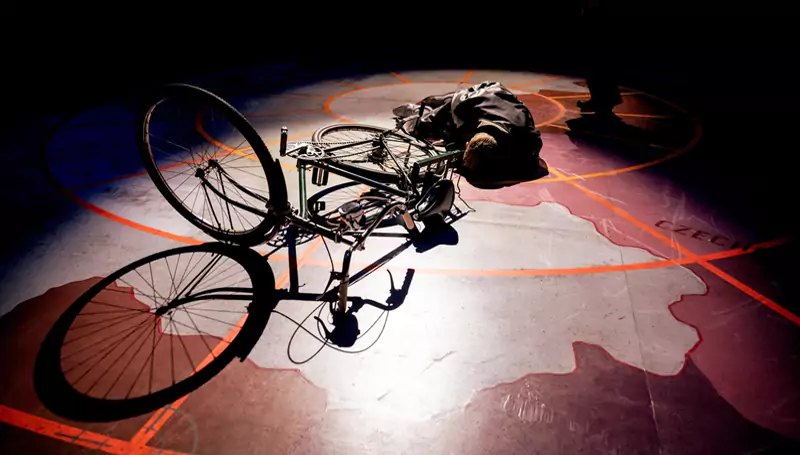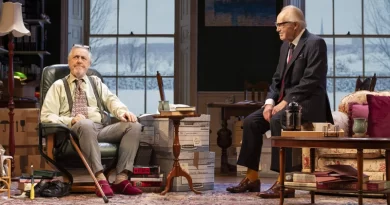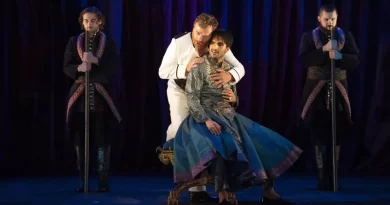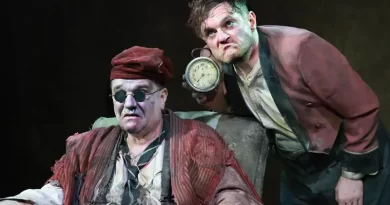“The Spy Who Came In From The Cold”, Chichester Festival Theatre
Jeremy Malies in West Sussex
4 September 2024
When the novel on which this play is based first came out in 1963, reviewers congratulated John le Carré on the way he had handled a theme of the end justifying the means even if the means are truly terrible. It’s one of the many aspects that David Eldridge taps into for his stage adaptation directed by Jeremy Herrin.
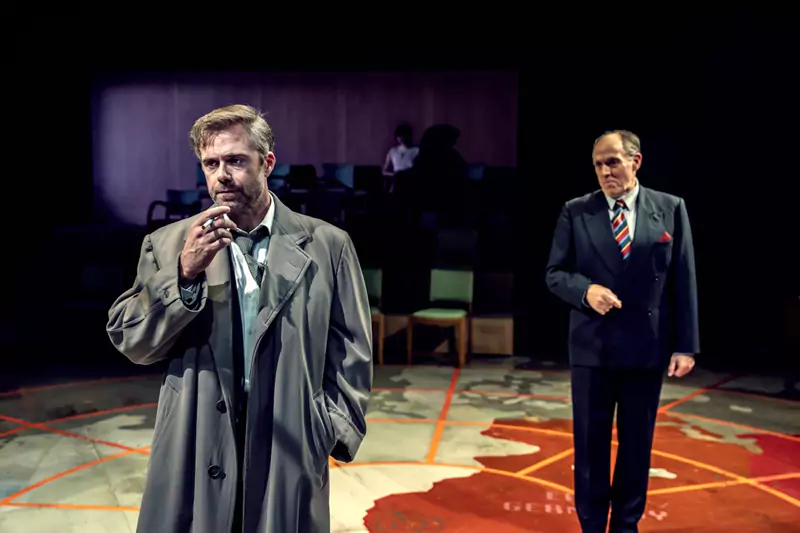
Rory Keenan and Ian Drysdale.
Photo credit: Johan Persson.
As well as his remarkable original plays such as Beginning, Eldridge has worked successfully adapting a film (the Dogme 95 movement’s Festen) and a play (Ibsen’s The Wild Duck). Now he succeeds with a novel that he renders bleak but never excessively dour. The essence of rackety agent Alec Leamas (Rory Keenan, a good deal more healthy-looking than Burton in the film) being used and betrayed in turns remains plausible on account of Herrin’s direction which ensures the piece is psychologically credible even though the stage presentation is expressionistic.
Ian Drysdale as Control and John Ramm as George Smiley/Karden could have sprung out of Pinter’s No Man’s Land but the stakes have been upped somewhat from booze and literature. Like Pinter, Eldridge plays with time but to good effect. Characters talk about an event as it happens and then reflect on it from a viewpoint years later and all in a trice. Eldridge is resourceful here since his technique minimizes exposition and keeps us to 130 minutes. It’s a brisk ride in which we feel the general loneliness underlined by fleeting moments of true connection between people.
As an Assange sceptic, I came away pondering the bravery of single spies (double agents are a different matter) and resolute in my views about the sanctity of government documents when brave agents are in the field. Eldridge shares Alan Bennett’s fascination not so much with the mechanics of being a spy but what it must be like to have a double life or in this case (the Leamas character) having another life constructed for you. Herrin’s direction, particularly the group work, impresses when Leamas is required to suggest a fake vulnerability by spending time in jail.
With today’s technology, there might be a way of taking out the East German supremo Mundt (played by Gunnar Cauthery) without the plot subtleties that le Carré injects. The production, down to props such as the bike ridden by Karl Riemeck (Mat Betteridge), suggests the period without being musty. Minor and major characters sit upstage, and just about everybody is visible throughout suggesting that people in this game are being dissected every moment.
If you think “talent” is a crude way to refer to creative people in the media, consider the use of “assets” to describe disposable players (all levels) in the spying game. George Smiley is indeed playing a game of three-dimensional chess in which gambits and sacrifices are strategy and nothing more.
Intricate syncopation in the original jazz by composer Paul Englishby makes a nightclub scene come alive. Agnes O’Casey, playing Jewish communist librarian Liz Gold, does not need it but the music becomes part of her allure. An early library scene (so much seems to revolve around Leamas’s sub-character) deliberately teeters towards Galton and Simpson radio comedy, and it works. Character actor Norma Atallah is allowed plenty of rein here but it’s all calibrated. And she shows her range as the remorseless President in the second-act tribunal.
“Before the war he was a Nazi. And now he’s a communist. How times change!” says Smiley of Mundt. It’s a great gag just in itself, but I also thought of the film The Lives of Others which shows surveillance of East Berlin residents by the Stasi with senior police having made a similar journey in their politics that brings them towards nihilism.
I liked the fact that set designer Max Jones makes the performance area circular with radius markings on the globe suggesting that people can circumnavigate the spying arena and reinvent themselves to the point that you can con the other side into doing your own dirty work. The set is on two tiers, and we see Smiley in front of a shed (perhaps at his home) on the gallery level with a view of everything. Our focus is Berlin, but it is as if tentacles extend everywhere. Jones’s design – as it should of course – has not been imposed but has grown from within the whole writing and performing effort.
Stage directions are precise, and they enable Ramm to make seemingly trivial gestures suggest that this is indeed a circus in which he is ringmaster and spymaster, lion tamer, and coach to the minor players. “All cats are alike in the dark” is one of the resonant lines. Lighting designer Azusa Ono brings us in and out of darkness with huge bolts and contributes to the overall dream quality here.
The title? Being in the cold means being out in the field, essentially alone, and in a culture where not only can you trust nobody, but sharp brains are pitched against you. Leamas – like so many gangsters – is given one last job and makes the mistake of falling in love. This is the first time anything by le Carré has been dramatized. Eldridge and Herrin are loyal to the writing but always bold and never risk-averse. I should like them to tackle the other novels.

